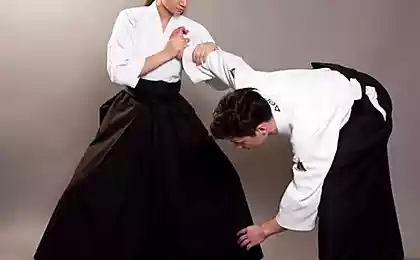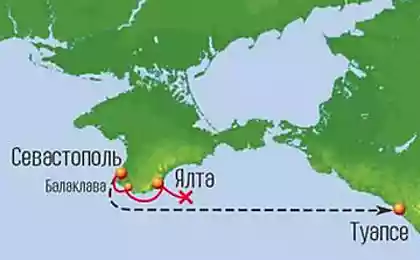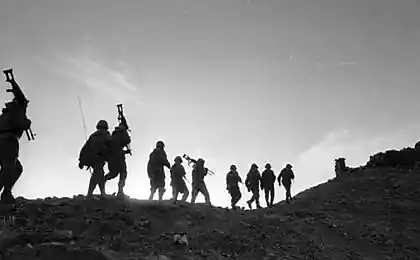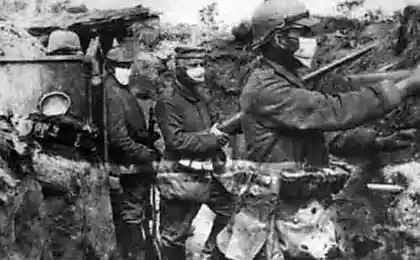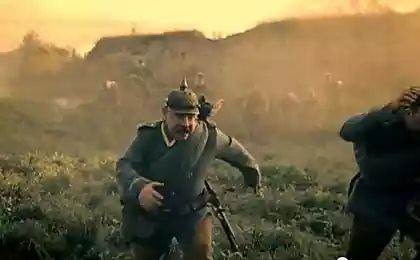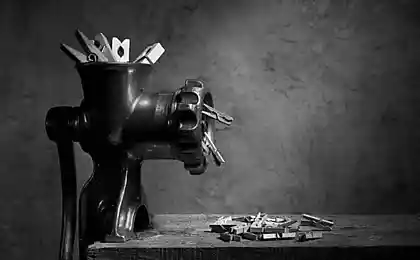1449
Crocodile Attack
February 19, 1945 crocodiles have eaten up to a thousand Japanese soldiers trying to escape from the British in the swamps.
In military history there is one incredible event on February 19, 1945, during a fierce battle on the island Ramram (Burma), English marines lured the Japanese army in the mangrove swamps, which lived thousands of saltwater crocodiles. As a result, the thousandth unit was destroyed - eaten by hungry reptiles. The English have not spent a single bullet or shell. The report of the Japanese army colonel Yasu Yunuko, declassified last year, testifies: "Ramram of mangrove swamps from the detachment returned alive only 22 soldiers and 3 officers." Check the special commission of the military court, which conducted an investigation 2 months later, showed that the water in the area of wetlands, an area of 3 square kilometers, 24% is from human blood. This story took place 2 months before the end of the Second World War, when the Japanese allies of Hitler has carried out a counter-offensive on all strategic positions, including the so-called South-Western Front. His key territorial link was long-range artillery base on the hill Johan situated in Burmese island Ramram. It was from there committed the most successful attack on British landing craft. When the object was discovered Anglo-American military intelligence, its destruction has been identified among the top five priorities for the 7 operational Airborne Squadron of the Royal British Navy. To protect the base of the Japanese command sent to the island of the best special unit of the army - sabotage corps №1, is considered to reflect the unrivaled mobile infantry attacks.
The commander of British airborne battalion Uayert Andrew was very cunning and resourceful officer. He sent scouts deep into the island, where they were impassable mangrove swamps, and learn that they are simply teeming with huge saltwater crocodiles decided to whatever was to lure the enemy squad. Major said: "Our uniforms and weapons are not intended for the passage of the marshes, unlike the Japanese, who are equipped with special costumes and a decent arsenal of knives. We lost everything. " On the commander in his trademark style, half-joking, he said: "Trust me, you will live ...».
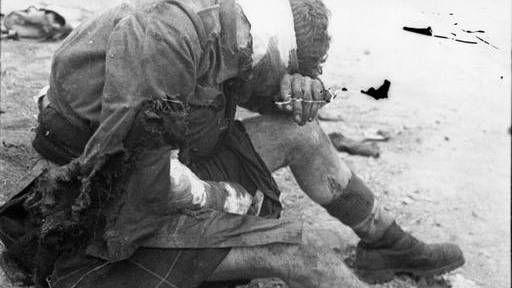
The calculation was stunning in its tactical elaboration. Once through the position of fighting the Japanese squad was put in the very depths of the swamp (which, by the way, the Japanese officers were only happy, thinking that here they get an advantage), Uayert ordered gradually retreat to the coastline, eventually leaving at the forefront of a small detachment under the cover of artillery.
After a few minutes watching through binoculars British officers witnessed a strange idea: despite the lull in the attacks, the Japanese soldiers, one by one, began to fall into the murky swamp muck. Soon, the Japanese squad had stopped resisting his military opponents: even stand on his feet to the fallen soldiers ran up and tried to pull out from somewhere, and then, too, falling and falling into the same epileptic seizures. Andrew ordered to retreat vanguard detachment, but met objections of fellow officers - they say that it is necessary to finish the reptiles. The next two hours the British, being on a hill, quietly watched as the rapidly melting powerful, well-armed Japanese army. As a result, the best commando regiment, consisting of 1215 selected experienced soldiers, repeatedly won greatly superior forces of the enemy, for which he was once enemies nicknamed "Tornado" was devoured alive by crocodiles. The remaining 20 soldiers who managed to escape from the deadly trap jaws, were successfully captured prisoner by the British.
This event went down in history as "the greatest number of human deaths from the animals." Also called the article in the Guinness Book of Records. "About a thousand Japanese soldiers were trying to repel the assault of the Royal Navy of Great Britain ten miles from the coast, in the mangrove swamps, home to thousands of crocodiles. Twenty soldiers were later captured alive, but most had been eaten by crocodiles. Infernal position retreating soldiers aggravated by a huge number of scorpions and tropical mosquitoes, which also attack them, "- said in the book of Guinness. Naturalist Bruce Wright, participating in the battle on the side of the British Battalion, claimed that crocodiles have eaten most of the soldiers of the Japanese squad, "This night was the worst, the kind that any of the men have ever experienced. Scattered in the black swamp muck screaming bloody Japanese, crushed in the mouths of huge reptiles, and strange sounds alarming was kind of spinning crocodiles cacophony of hell. Such a spectacle, I think few people could see on the ground. At dawn the vultures arrived to clean up what was left of crocodiles ... 1,000 Japanese soldiers that entered the swamps Rami, only about 20 were found alive ».
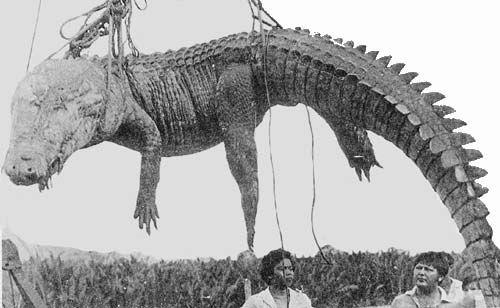
Saltwater crocodile is still considered the most dangerous and the most aggressive predator on the planet Earth. Off the coast of Australia is from saltwater crocodile attacks kill more people than a great white shark attack that mistakenly popularly considered the most dangerous animal. This species of reptile has the strongest bite in the animal world: large individuals can bite with a force of more than 2500 kg. In one case was recorded in Indonesia, suffolsky stallion weighing a ton and able to drag more than 2,000 kg, was killed by a large male sea saltwater crocodile, which dragged the victim into the water and pulled the horse's neck. The strength of his jaws is such that it is capable of a few seconds to crush the skull of a buffalo, or sea turtle shell.
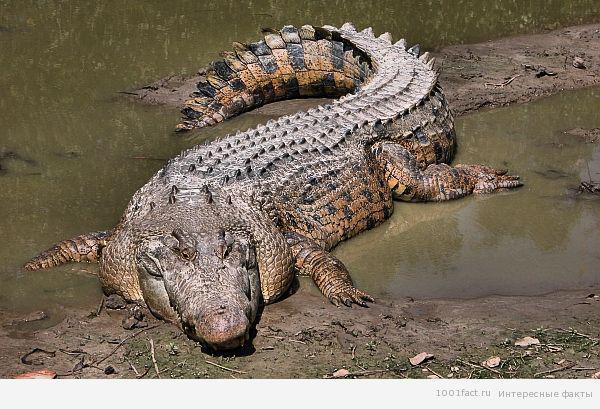
Source: expert.ru
In military history there is one incredible event on February 19, 1945, during a fierce battle on the island Ramram (Burma), English marines lured the Japanese army in the mangrove swamps, which lived thousands of saltwater crocodiles. As a result, the thousandth unit was destroyed - eaten by hungry reptiles. The English have not spent a single bullet or shell. The report of the Japanese army colonel Yasu Yunuko, declassified last year, testifies: "Ramram of mangrove swamps from the detachment returned alive only 22 soldiers and 3 officers." Check the special commission of the military court, which conducted an investigation 2 months later, showed that the water in the area of wetlands, an area of 3 square kilometers, 24% is from human blood. This story took place 2 months before the end of the Second World War, when the Japanese allies of Hitler has carried out a counter-offensive on all strategic positions, including the so-called South-Western Front. His key territorial link was long-range artillery base on the hill Johan situated in Burmese island Ramram. It was from there committed the most successful attack on British landing craft. When the object was discovered Anglo-American military intelligence, its destruction has been identified among the top five priorities for the 7 operational Airborne Squadron of the Royal British Navy. To protect the base of the Japanese command sent to the island of the best special unit of the army - sabotage corps №1, is considered to reflect the unrivaled mobile infantry attacks.
The commander of British airborne battalion Uayert Andrew was very cunning and resourceful officer. He sent scouts deep into the island, where they were impassable mangrove swamps, and learn that they are simply teeming with huge saltwater crocodiles decided to whatever was to lure the enemy squad. Major said: "Our uniforms and weapons are not intended for the passage of the marshes, unlike the Japanese, who are equipped with special costumes and a decent arsenal of knives. We lost everything. " On the commander in his trademark style, half-joking, he said: "Trust me, you will live ...».

The calculation was stunning in its tactical elaboration. Once through the position of fighting the Japanese squad was put in the very depths of the swamp (which, by the way, the Japanese officers were only happy, thinking that here they get an advantage), Uayert ordered gradually retreat to the coastline, eventually leaving at the forefront of a small detachment under the cover of artillery.
After a few minutes watching through binoculars British officers witnessed a strange idea: despite the lull in the attacks, the Japanese soldiers, one by one, began to fall into the murky swamp muck. Soon, the Japanese squad had stopped resisting his military opponents: even stand on his feet to the fallen soldiers ran up and tried to pull out from somewhere, and then, too, falling and falling into the same epileptic seizures. Andrew ordered to retreat vanguard detachment, but met objections of fellow officers - they say that it is necessary to finish the reptiles. The next two hours the British, being on a hill, quietly watched as the rapidly melting powerful, well-armed Japanese army. As a result, the best commando regiment, consisting of 1215 selected experienced soldiers, repeatedly won greatly superior forces of the enemy, for which he was once enemies nicknamed "Tornado" was devoured alive by crocodiles. The remaining 20 soldiers who managed to escape from the deadly trap jaws, were successfully captured prisoner by the British.
This event went down in history as "the greatest number of human deaths from the animals." Also called the article in the Guinness Book of Records. "About a thousand Japanese soldiers were trying to repel the assault of the Royal Navy of Great Britain ten miles from the coast, in the mangrove swamps, home to thousands of crocodiles. Twenty soldiers were later captured alive, but most had been eaten by crocodiles. Infernal position retreating soldiers aggravated by a huge number of scorpions and tropical mosquitoes, which also attack them, "- said in the book of Guinness. Naturalist Bruce Wright, participating in the battle on the side of the British Battalion, claimed that crocodiles have eaten most of the soldiers of the Japanese squad, "This night was the worst, the kind that any of the men have ever experienced. Scattered in the black swamp muck screaming bloody Japanese, crushed in the mouths of huge reptiles, and strange sounds alarming was kind of spinning crocodiles cacophony of hell. Such a spectacle, I think few people could see on the ground. At dawn the vultures arrived to clean up what was left of crocodiles ... 1,000 Japanese soldiers that entered the swamps Rami, only about 20 were found alive ».

Saltwater crocodile is still considered the most dangerous and the most aggressive predator on the planet Earth. Off the coast of Australia is from saltwater crocodile attacks kill more people than a great white shark attack that mistakenly popularly considered the most dangerous animal. This species of reptile has the strongest bite in the animal world: large individuals can bite with a force of more than 2500 kg. In one case was recorded in Indonesia, suffolsky stallion weighing a ton and able to drag more than 2,000 kg, was killed by a large male sea saltwater crocodile, which dragged the victim into the water and pulled the horse's neck. The strength of his jaws is such that it is capable of a few seconds to crush the skull of a buffalo, or sea turtle shell.

Source: expert.ru
